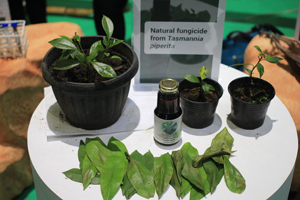
To respond to this challenge, the Central Mindanao University (CMU) screened ten potential indigenous plants from Mindanao. Of these, it was found that the leaves of Tasmannia piperita (Hook.f.) Miers are effective when used as organic fungicide.
T. piperita is a shrub or treelet indigenous to the Philippines, Borneo, Sulawesi, Moluccas, Flores, New Guinea, and Australia. It grows in exposed ridges and peaks of high-altitude mossy forests.
Since it uses local ingredients, the natural fungicide is affordable to vegetable growers. Most importantly, using the fungicide can be safe for non-target organisms and to human health.
When used on plants, the organic fungicide can prevent leaf spot disease of lettuce caused by Alternaria brassicae and the late blight disease of tomato caused by Phytophthora infestans.
The project is funded by the Philippine Council for Agriculture, Aquatic and Natural Resources Research and Development of the Department of Science and Technology (DOST-PCAARRD).
